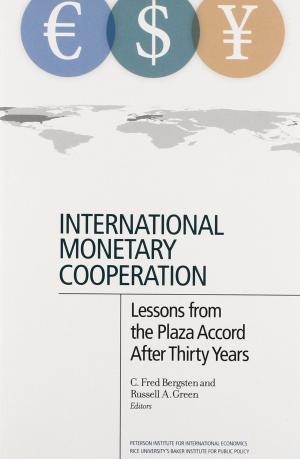Managing the Euro Area Debt Crisis
Business & Finance, Economics, Public Finance, Money & Monetary Policy, Nonfiction, Social & Cultural Studies, Political Science, International| Author: | William Cline | ISBN: | 9780881326888 |
| Publisher: | Peterson Institute for International Economics | Publication: | May 15, 2014 |
| Imprint: | Peterson Institute for International Economics | Language: | English |
| Author: | William Cline |
| ISBN: | 9780881326888 |
| Publisher: | Peterson Institute for International Economics |
| Publication: | May 15, 2014 |
| Imprint: | Peterson Institute for International Economics |
| Language: | English |
First came the financial and debt crisis in Greece, then government financing difficulties and rescue programs in Ireland in 2010 and Portugal in 2011. Before long, Italy and Spain were engulfed by financial contagion as well. Finally in 2012, the European Central Bank pledged to do "whatever it takes" to preserve the euro area with purchases of government bonds, a step that achieved impressive results, according to William R. Cline in this important new book.
One of the world's leading experts on fiscal and debt issues, Cline mobilizes meticulously researched and forceful arguments to trace the history of the euro area debt crisis and makes projections of future debt sustainability. He argues that euro area leaders made the right decision to keep the euro from breaking apart but warns against complacency about the future. Cline contends that troubled European economies should continue their fiscal consolidation but that further debt restructurings for most countries are not called for. Greece is a special case and may need some further debt relief contingent on continued progress on fiscal and structural reform, however. In this landmark study, Cline offers a detailed analysis of the mistakes, successes, and options for Europe as it struggles to overcome its worst economic disaster since World War II.
First came the financial and debt crisis in Greece, then government financing difficulties and rescue programs in Ireland in 2010 and Portugal in 2011. Before long, Italy and Spain were engulfed by financial contagion as well. Finally in 2012, the European Central Bank pledged to do "whatever it takes" to preserve the euro area with purchases of government bonds, a step that achieved impressive results, according to William R. Cline in this important new book.
One of the world's leading experts on fiscal and debt issues, Cline mobilizes meticulously researched and forceful arguments to trace the history of the euro area debt crisis and makes projections of future debt sustainability. He argues that euro area leaders made the right decision to keep the euro from breaking apart but warns against complacency about the future. Cline contends that troubled European economies should continue their fiscal consolidation but that further debt restructurings for most countries are not called for. Greece is a special case and may need some further debt relief contingent on continued progress on fiscal and structural reform, however. In this landmark study, Cline offers a detailed analysis of the mistakes, successes, and options for Europe as it struggles to overcome its worst economic disaster since World War II.















